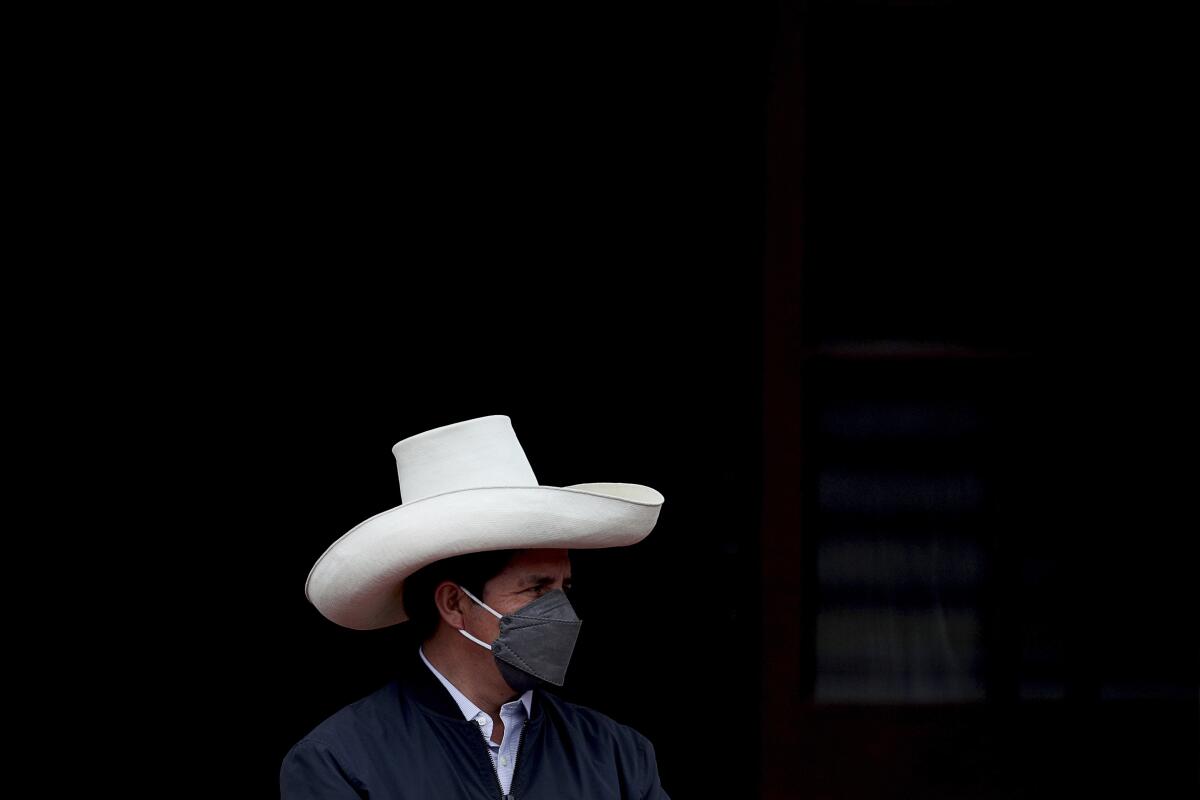One year in, Peruvians turn against outsider president

- Share via
TUPE, Peru — In the last town on a road in the Peruvian Andes, María Acevedo has a tiny convenience store but primarily lives off the crops and livestock she raises on her land.
Like many other residents of Tupe, where the Indigenous language Jaqaru is still spoken, she voted for schoolteacher Pedro Castillo for president last year, drawn in part by the possibility of seeing the nation led by someone with rural roots like her own.
That sentiment was shared by many people across Peru, which propelled the political neophyte Castillo to victory in a runoff election that stunned the South American country’s political class.
It also buoyed the hopes of many Peruvians that an outsider could bring needed changes to improve public services, including education and health, whose inadequacies were highlighted by the pandemic.
Now, after a year in the presidency, Castillo’s popularity is in shambles, decimated by what critics characterize as a chaotic management style and corruption allegations.
Still, in rural areas many voters believe the fault for the executive crisis lies not only with Castillo, but with Congress, which has sought to remove him twice.
“We want him to get to five years [in office], to work, to fulfill his promise. Why are they going to throw him out?” said Acevedo, dressed in the red-and-black suit typically worn by women in her community. “We want him to learn. Nobody becomes president knowing” what do do.
Acevedo, who is concerned about rising food and fuel prices that have led to regional protests, said the rich in the capital, Lima, “do not let” Castillo work.
Castillo, 52, campaigned with the slogan “no more poor in a rich country.” He promised to fight corruption, raise taxes on mining profits, rewrite the constitution and end alleged monopolies that affect the prices of domestic gas and medicine.
But he was met by a Congress all too eager to continue the political squabbling that has seen presidents and lawmakers seek to cut short each other’s terms.
In 2019, President Martín Vizcarra dissolved Congress and called legislative elections. The next year, the new Congress removed Vizcarra. Manuel Merino was appointed president by Congress but resigned less than a week later after deadly protests.
He was replaced by Francisco Sagasti, who after nine months was succeeded by Castillo on July 28, 2021.
Since then, Congress has approved a commission to investigate allegations of fraud in the presidential election, claims that electoral authorities and independent observers dispute. On two occasions, lawmakers also tried to dismiss Castillo for purported moral incapacity but did not reach the necessary 87 votes to move forward.
Congress also has shelved Castillo’s proposed steps for a constitutional reform. But the president himself has not introduced a detailed agricultural overhaul that was among his top campaign promises.
Only about 19% of Peruvians approve of the job being done by Castillo, who defeated Keiko Fujimori in the runoff by about 44,000 votes. But that is higher than the 12% rating for Congress, according to polls by the Institute of Peruvian Studies.
Castillo “has promised many things, such as structural changes. Many people have trusted [him], but acting as president he has many shortcomings, which makes people suspicious,” said Arnulfo Casas, a retired teacher who worked for decades in the Amazon region and returned to Tupe to care for his sick wife.
But Casas also isn’t happy with Congress.
“The parties that have lost do not let [Castillo] work; everything is opposition,” said Casas, who runs a juice store. “Most of the residents of the mountains and the jungle want Castillo to continue legally.”
The lack of achievement is hurting the president, analysts say. “In the various social sectors there are a series of unfulfilled expectations that have generated disappointment and a climate of discontent and exhaustion,” said Rodrigo Gil, professor of political science at Antonio Ruiz de Montoya University in Lima.
Castillo, at times, has hurt his own image by making mistakes, such as confusing Croatia and Ukraine when talking about Russia’s invasion — a slip that drew mockery on social media and criticism by traditional media and politicians.
The president also faces five investigations. Four are looking into allegations of corruption and one is studying claims of plagiarism of his master’s thesis in educational psychology that was presented in 2012.
“Some think that here we are going to give in, even though they mess with your children, with your parents, with your family. In 11 months, they do not find a single piece of evidence,” Castillo said recently about the corruption inquiries.
He has said that he did not seek to become president to “stick his nails” into the public treasury. He says that if he should be found guilty, his father will disinherit him, and he will submit to a type of peasant justice system that punishes cattle thieves with horrible whippings and other physical punishments.
Castillo’s lack of experience in public management has shown up in a revolving door among his Cabinet secretaries.
In February, amid a third wave of COVID-19 cases, he replaced a health minister who promoted vaccination with a doctor who had touted a type of water that supposedly slows aging.
After a massive oil spill in the Pacific, Castillo replaced the environment minister with an inexperienced geography expert who resigned in eight days.
Since February, the Ministry of Agriculture has had four secretaries as Peru grapples with the shortage and rising prices of Russian fertilizers due to the war in Ukraine.
“It is a very precarious government, focused on sticking its neck out of the water and breathing day by day to survive,” Gil said.
More to Read
Sign up for Essential California
The most important California stories and recommendations in your inbox every morning.
You may occasionally receive promotional content from the Los Angeles Times.










